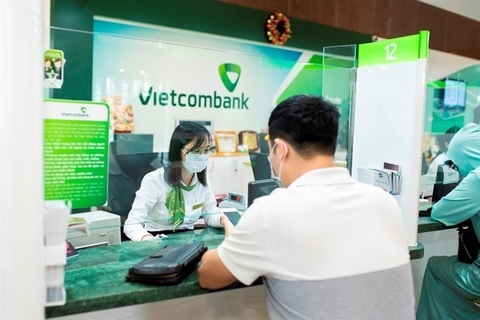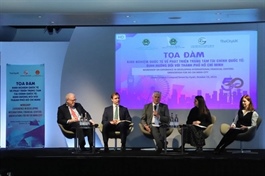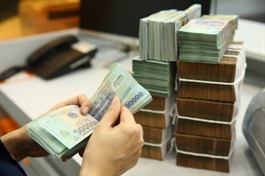PM calls for credit access to be improved
PM calls for credit access to be improved
Prime Minister Phạm Minh Chính has sent an official telegram to the Governor of the State Bank of Việt Nam, Minister of Finance, and chairmen of provincial and municipal People’s Committees to ask for more drastic implementation of solutions to increase capital access and remove difficulties for production and business.

A customer conducts a transaction at a branch of Vietcombank. Monetary policies must be timely, flexible and efficient to promote growth, stabilise the economy and control inflation. — VNA/VNS Photo |
The request came after the credit growth rate was reported at a disappointingly low 6.29 per cent as of October 11, compared to the rate of 11.12 per cent in the same period last year and the target of 14-15 per cent for the full year.
Chính asked the State Bank of Việt Nam to closely watch the market developments to have timely, flexible and efficient monetary policies with priority on promoting growth, stabilising macro-economic situation, controlling inflation, and ensuring major economic balances and safety for the credit system.
The credit growth must be managed reasonably and effectively to achieve the target, while the credit quality must be improved and the flow be directed into production, business and prioritised sectors which would drive economic growth, including investment, consumption and export. In addition, control must be tightened on credit flow into risky sectors.
It was critical to simplify lending procedures and rates, and drastically implement the VNĐ120 trillion credit programme for property and home buyers of social housing projects and the VNĐ15 trillion package for the forestry and fishery sectors.
The focus would be on timely raising measures to remove problems in accessing capital and bond markets to ensure market stability and credit system safety.
The Prime Minister also asked the Ministry of Finance to implement expansionary fiscal policy, focus reasonably and effectively to accelerate investments, especially private investment together with public investment to promote growth, stabilise macroeconomy and control inflation.
Chính requested the Ministry of Finance to study measures in tax and fee reductions and extensions for 2024 to provide support to enterprises to overcome the difficult time.
Tax collection must be strengthened in sectors such as e-commerce and night economy, while the procedures for tax refunds must be sped up.
The finance ministry’s statistics showed that fiscal support packages were estimated to total around VNĐ196 trillion this year, bringing the total fiscal support to VNĐ700,000 trillion in 2020-23 period.
The public investment plan for this year was more than VNĐ700,000 trillion, 25 per cent higher than last year.
Minister of Finance Hồ Đức Phước said that supports to the economy had been at unprecedented level in recent years, accounting for around 8.3 per cent of the country’s gross domestic product (GDP), much higher than other countries with the same economic scale.
As fiscal policy was just one among many solutions to deal with the economic difficulty, the core issue was how to increase the aggregated demand of the economy, Phước said. “It is necessary to synchronously implement solutions, including monetary policy, investment policy, administrative and investment climate reforms, and speed up public investment disbursements,” Phước said.
Removing difficulties for production and business played a vital role, especially in the real estate sector, Phước said, adding that Việt Nam also needed to continue improving the investment climate to increase the attraction of foreign direct investment (FDI).
Export remained struggling as markets were narrowing down, putting significant pressure on enterprises, he added, adding that measures were needed to expand export markets and pave the way for Vietnamese goods to extend international shares, he said.
In 2024-25, the fiscal policy must be implemented with flexibility in the short term, but strictly complying with the principle of budget balance and financial discipline in the long term, Phước said. “The world is facing unusual changes, Việt Nam needs special solutions to counter these,” he said.
Room for further rate cuts?
Lowering rates was an important solution to aid the economy.
From the beginning of this year, the State Bank of Việt Nam slashed operating rates four times, bringing the refinancing rate to 4.5 per cent and rediscount rate to 3 per cent in order to create favourable conditions for commercial banks to reduce rates and increase lending.
Deputy Governor of State Bank of Việt Nam Đào Minh Tú said that the management on rates would be stable in coming time, adding that when conditions permitted, rates could be cut further.
He also urged banks to continue lowering lending rates, especially for existing loans.
According to Trần Xuân Bách, market analyst at Bảo Việt Securities Company, as inflation was still under control, there was room to continue to cut rates in the last quarter of this year and there was no sign for reversing the trend of loosening monetary policy this year.
Economic expert Đinh Trọng Thinh said that there was still the possibility of continuing to lower rates, but the room narrowed significantly.
The central bank might keep operating rates unchanged or reduce them slightly by 0.25 percentage points, he said.
Deposit rates might continue to decrease but the pace would be slow while lending rates would decrease faster, Thịnh said.
Sharing the same viewpoint, Deputy Director of the Banking Academy Phạm Thị Hoàng Anh said that it was not necessary for the central bank to further cut operating rates till the year end. Deposit rates at commercial banks would be maintained at the current levels but lending rates could be lowered.
Banks must reduce operation costs reasonably to create room for further cuts, she said.
From the beginning of October, more than 22 commercial banks cut deposit rates.
Vietcombank cut rates from last Friday, to 2.8 per cent for deposits of one-month term, 4.1 per cent for six-month and the highest rate of 5.1 per cent for deposits with terms from one year or more.
Vietcombank offered the lowest deposit rates among the Big4, including Agribank, BIDV and Vietinbank. The highest deposit rate among the Big4 was 5.3 per cent.
A survey by the State Bank of Việt Nam found that credit growth was expected at 4.6 per cent in the last quarter of this year, which meant that the credit growth would be at 12.3 per cent for the full year.




























